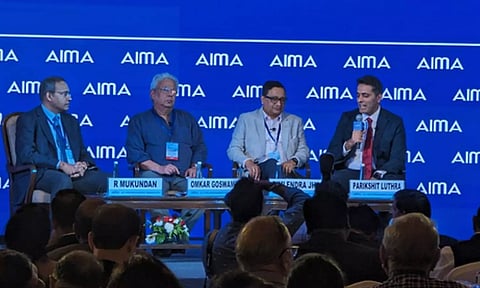

NEW DELHI: India needs to build capacity in new areas, as intellectual property will be a key value creator in the next economy, according to Ramakrishnan Mukundan, Managing Director & CEO, Tata Chemicals Ltd.
Addressing the 50th National Management Convention organised by All India Management Association (AIMA), he said that if India can build capacity in new economic areas, its GDP will double in a decade.
According to Mukundan, policies will play a key role in driving Indian economy, as AI, digital rights, and land acquisition will be central to growth.
"India needs to anticipate the new areas of growth and build capabilities there," Mukundan said, as he listed scale, skills, and standards as India's most urgent requirements.
On the India's chances of becoming a manufacturing country and having a large piece of the global supply chains, Mukundan said that India must focus on scale in everything. India must build for the next 30 years and not for the next five. Scale, he said, builds cost competitiveness, gets inputs, and makes the market.
"India has to imagine producing for 1.4 billion people here and more," he said.
Bimlendra Jha, Managing Director, Jindal Steel & Power Ltd, said that it is not possible to make policies predictable in a world full of complexity and uncertainty. He said that policies have to evolve. He pointed to land acquisition as an obvious bottleneck to India's industrial growth.
"Reforms are needed to allow blockchains to determine the land owner," he said.
However, Jha added that policies are over-rated because opportunities are created by people.
"Policies do not stop the juggernaut. Instead, policies follow. Political will has to be subordinate to people's will," he said.
Omkar Goswami, Founder and Chairperson, CERG Advisory Pvt Ltd, predicted that Indian economy will grow at an average rate of 6-6.2 per cent over the next five years.
However, he said that India's demographic dividend could turn into a demographic nightmare because India's growing mass of young people is largely unequipped to be employed.
"Outside cities, young people can see how the better off people live and they notice that they are not getting the benefit of growth," he said.
Goswami also pointed to the declining percentage of women's participation in formal work and said that no country in the world has advanced without a large percentage of women participating in the workforce.
Talking about women's involvement in formal work, Mukundan said that more women are coming out of colleges now than men and Tata Chemicals' last two batches of hirings has included more women than men.
Jha argued that the household work of women must be counted and valued.
"Not all paid work is valuable and not all valuable work is paid," he said.
On the issue of unemployment and underemployment of the youth, Jha said that today digitalisation has democratised education and opportunity.
"More and more people will be employed on their own terms and they will create jobs that did not exist earlier," Jha said.
India needs to educate its children so that can leverage the power of technology and grab opportunities, he added.
Goswami said that India should focus on entrepreneurship and not on what someone is producing, as directed economy has a history of failure.
"Competitive advantage happens because of universities," he said.
Talking about India's bid to make semiconductors, Mukundan said that India does not have the skills for that industry yet and it has to import people in the beginning.